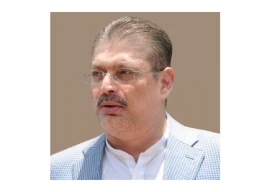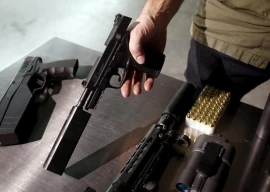
After months of imprisonment in India, many fishermen returned home to find their worlds turned upside down — wives married to other men, children dispersed. This was not the reception they had dreamed of.
“What choice do they [women] have when the only breadwinner in their family is gone for months? Any chaste woman would rather marry a man to get financial help rather than submit to his illegal demands,” said Amin, a fisherman who was on the women’s side.
Amin was present at the Karachi Press Club along with several other people for a reception hosted by the Pakistan Fisherfolk Forum (PFF) and the Pakistan Institute of Labour Education and Research (Piler) on Wednesday in honour of the 61 fishermen recently freed by the Indian government. These men belong to the fishing communities of Karachi, Thatta, Keti Bander, Kharo Chaan, Shah Bandar, Jati, Chauhar and Badin.
Recalling his days in jail in Gujarat, Amin shared how he used to work to arrange money for ‘beedi’, the cheaper version of cigarettes in India, and how he managed to wash his clothes for an entire month with just one small bar of highly acidic soap.
Faqir Mohammad, who spent 15 months in jail, said they were under the ‘nazarband’ status with the strictest of restrictions because they were suspected of being ‘aatankwadi’ or terrorists by the Indian agencies. “They blindfolded us for 15 days and beat us up in an effort to elicit ‘the truth’,” he said.
He came back home to find his wife and three children living in a terrible state. His children had quit school and they were barely making ends meet. But his homecoming only alleviated their condition slightly. Since Faqir’s fishing equipment had been seized by the Indian authorities, he had to switch professions and is now trying to grow and reap rice to earn a living.
However, it was not just the Indian government with which the fishermen were angry. For Shafiq, who spent 13 months in jail and thought prison was “not that bad”, the local authorities are to blame. Many Bengali fishermen are languishing in Indian jails due to the dubious status of their identities. “Our government doesn’t issue us NIC cards until we show them some proof of our presence in the country before and after 1971 and the Indian government doesn’t free the captured fishermen until the Pakistani government confirms that they are Pakistani citizens,” he explained.
Karamat Ali of Piler said that both India and Pakistan’s government officials had recently decided that instead of arresting one another’s fishermen, they would politely ask them to go back and enjoy fishing in their own territory. However these encouraging decisions have not been implemented yet because there are undefined sea waters and sometimes strong winds and high tides push boats into the other country’s territory. These are still called border transgressions, he pointed out.
Ali also agreed that recognition of the fishermen’s national status is a major stumbling block, which needs to be addressed by the government. Because of this problem the Pakistani government can not respond when it receives a list of Pakistani fishermen who have completed their legal sentences in Indian jails and are awaiting release.
Published in The Express Tribune, December 2nd, 2010.




1727594410-0/diddy-(1)1727594410-0-165x106.webp)
1727595536-0/Untitled-design-(1)1727595536-0-270x192.webp)






1727268465-0/Untitled-design-(42)1727268465-0-270x192.webp)




COMMENTS
Comments are moderated and generally will be posted if they are on-topic and not abusive.
For more information, please see our Comments FAQ